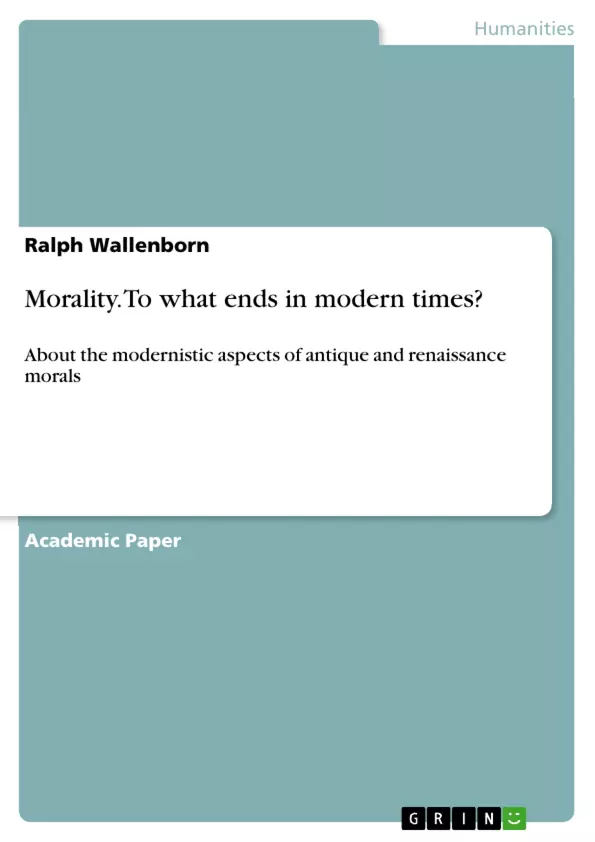In this paper, I want to show that the emancipation of the Self did not just start in the eighteenth century with the enlightenment, but earlier – even in Hellenism. Basically, my research revolves around the question, to what extent moral standards still have a binding nature; are they useful to let people participate, because they appeal to a personal sense of morality, or are they solely based upon an alleged sensus communis?
Inhaltsverzeichnis (Table of Contents)
- Morality in ancient times
- Introduction and definition of the problem
- Plato and Aristotle
- Summary
- Stoicism and Epicureanism
- Summary
- Eclecticism and Scepticism
- Summary
- Renaissance authors
- The adaptation of Plato and Aristotle in the Renaissance
- Summary
- Stoicism and Epicureanism in the Renaissance
- Summary
- Eclecticism and Skepticism in the Renaissance
- Summary
- Morality: to what ends in modern times?
- Some general conclusions
- The traces of different forms of morality in our times
- Modern Western societies: a lack of shared morality?
Zielsetzung und Themenschwerpunkte (Objectives and Key Themes)
This paper investigates the evolution of morality from ancient Greece to the Renaissance and into modern times, examining how the concept of morality has shifted and adapted. The primary focus is on the relationship between personal morality and public life, exploring whether there is still a binding nature to moral standards in modern society.
- The evolution of morality from ancient Greece to the Renaissance and into modern times
- The relationship between personal morality and public life
- The role of reason and intellect in shaping morality
- The influence of philosophical schools on moral thought
- The impact of globalization and secularization on moral values
Zusammenfassung der Kapitel (Chapter Summaries)
The first chapter explores morality in ancient Greece, focusing on the ideas of Plato and Aristotle. It examines how their philosophies intertwined personal morality with political life, emphasizing the importance of reason and intellectual leadership. The chapter also discusses the transition from an 'ontological' morality to a more practical approach during the Hellenistic period.
The second chapter examines the Renaissance period, analyzing how Renaissance authors adapted and reinterpreted the ideas of ancient philosophers. It explores the influence of Christian faith and the emergence of humanism and reformation as forces challenging traditional moral frameworks.
The third chapter delves into the question of morality in modern times, discussing the impact of the Enlightenment and the rise of individualism. It examines the tension between personal freedom and shared values in modern Western societies, exploring the potential consequences of a lack of shared morality in a globalized world.
Schlüsselwörter (Keywords)
This paper focuses on the evolution of morality, examining key concepts such as personal morality, public life, reason, intellect, philosophical schools, ancient Greek philosophy, Renaissance thought, Enlightenment, individualism, globalization, secularization, and the impact of these factors on moral values in modern Western societies.
Frequently Asked Questions
How has the concept of morality evolved since ancient Greece?
Morality shifted from Plato and Aristotle's reason-based ontological approach to a more practical Hellenistic approach, and later toward modern individualism.
What was the relationship between morality and politics for Plato and Aristotle?
They intertwined personal morality with political life, viewing reason and intellectual leadership as essential for both the individual and the state.
How did the Renaissance reinterpret ancient moral philosophy?
Renaissance authors adapted Stoicism, Epicureanism, and Scepticism, often reconciling these ideas with Christian faith and humanism.
What is the impact of secularization on modern morality?
Secularization and the Enlightenment led to a rise in individualism, often creating a tension between personal freedom and shared societal values.
Is there still a "shared morality" in modern Western societies?
The paper explores whether moral standards still have a binding nature or if modern globalization has led to a lack of a cohesive "sensus communis."
- Citation du texte
- Ralph Wallenborn (Auteur), 2013, Morality. To what ends in modern times?, Munich, GRIN Verlag, https://www.grin.com/document/344298



